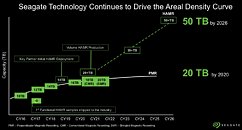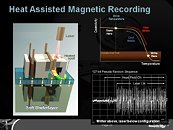Wednesday, November 6th 2019

Seagate's Roadmap Calls for 18 TB, 20 TB Drives in 2020, 50 TB by 2026
Seagate announced its roadmap for the coming years, and the company is naturally fighting tooth and nail for the relevance of HDD technology in the market. While the benefits of SSDs are already well understood by the entire industry, in some scenarios, it makes more sense to make use of high-density HDDs - particularly where deployment space is at a premium, and in scenarios where seek times for information stored on the media aren't all that important. This is why the company is aggressively pushing its new HAMR technology as a way to increase areal density on traditional platter-based media.
Plans to achieve 18 TB and 20 TB density HDDs in the first semester of 2020 seem to be well within reason, considering the company has recently shipped 16 TB HDDs. These HDD solutions will still make use of older technologies such as CMR (Conventional Magnetic Recording), for the 18 TB drives) and SMR (Shingled Magnetic Recording) for their 20 TB 2020 products. The company will later make use of their proprietary HAMR (Heat Assisted Magnetic Recording) technology in order to upgrade their 20 TB, and 20 TB+ HDDs with higher performance (and density) than can be achieved with the tried and true SMR. When it comes to performance improvements, a latent disadvantage in HDDs compared to solid state solutions, the company will eventually deploy HDDs which make use of two sets of read/write heads instead of a single one.
Source:
NL.Hardware
Plans to achieve 18 TB and 20 TB density HDDs in the first semester of 2020 seem to be well within reason, considering the company has recently shipped 16 TB HDDs. These HDD solutions will still make use of older technologies such as CMR (Conventional Magnetic Recording), for the 18 TB drives) and SMR (Shingled Magnetic Recording) for their 20 TB 2020 products. The company will later make use of their proprietary HAMR (Heat Assisted Magnetic Recording) technology in order to upgrade their 20 TB, and 20 TB+ HDDs with higher performance (and density) than can be achieved with the tried and true SMR. When it comes to performance improvements, a latent disadvantage in HDDs compared to solid state solutions, the company will eventually deploy HDDs which make use of two sets of read/write heads instead of a single one.


35 Comments on Seagate's Roadmap Calls for 18 TB, 20 TB Drives in 2020, 50 TB by 2026
But over all I am so ready to skip HDD and go all to SSD if just prices cut get down to level where high capacity SSD can be affordable for us mortals.
Science isn't magic, nor money and resources fall from the trees, things are developed according to necessities and profit in this system.
HDD might have some advantage in some use scenarios, but not to me. To me the only reason I still use HDD is because large SSD still cost a fortune. HDD are for me slow and frankly annoying to wait for to transfer files from and to. Slow, annoying and for my experience less reliable than SSD. I have had 3 HDD failures while so far zero SSD failures and I have used SSD since like 2011.
No science is not magic. But I still just wait for SSD to come down I price and then they do in the future, I am so done with HDD for good.
I may sound a bit selfish, but when I am used to the speed of an nvme SSD, HDD are just plain annoyingly slow for file transfers and other things + the annoying spin up whine some of my older HDD had and the vibration to. Frankly the only advantage HDD still have over SSD is price to capacity in my opinion.
I've got just about 3TB of moves/tv shows/pictures on my Plex server. The 4GB 5400RPM NAS HDDs I have in it work great. I've ran up to 4 different devices streaming 1080p movies off the server without issues. At most, there are usually only 2 devices using the Plex server. The HDDs work great for streaming movies/shows. Only problem I'm going to run into soon is lack of storage space.
For me, the main issue is the cost of a high capacity SSD that just doesn't fit my budget.
Even if I wanted to move to a 4TB SSD for some reason, they're in the $450+ range
I'd much rather spend half that cost of a 4TB SSD and find an 8TB HDD. But that's just me.
Lucks been about the same as long I stayed with those rules.
Plus HDD prices are not moving down. If a new capacity point is intruduced it will cost more and the prices do not fall at all. 14TB drives cost ~400€. 16TB drives ~500€ and im sure 18TB drives will cost 600€ and 20TB drives will be over 700€. These are best case prices.
I thought about building myself two 8TB SSD's comprised on Intel 660p modules. That would cost me 1600€+ for 16TB of SSD storage. HDD would cost me around 550€.
Still too expensive for bulk storage. 15TB SSD's cost 4000€+ so those are even more expensive.
Since I'm not a YouTuber or get given hardware for free like many of us, I have to pay for everything I have.. When you're looking at possibly adding some more storage to your home NAS and getting some new backup drives in as well, 12 x 12Tb drives cos come in at a pretty penny... I sadly couldn't afford 1 12Tb drive at the moment so I have to make do with anything I can to put data on whatever it is.
Watching a few YouTube videos last night Seagate seem to hand drives out to a load of YouTubers for their storage needs.. Maybe I do need to get on YouTube and then I could get some more storage.... That said, I do have some LTO5's I can use....
But I digress... I also thought that SSD's didn't manage to store data long term?
source:
www.extremetech.com/extreme/175089-who-makes-the-most-reliable-hard-drives
I am an ASIC Engineer at Seagate btw.